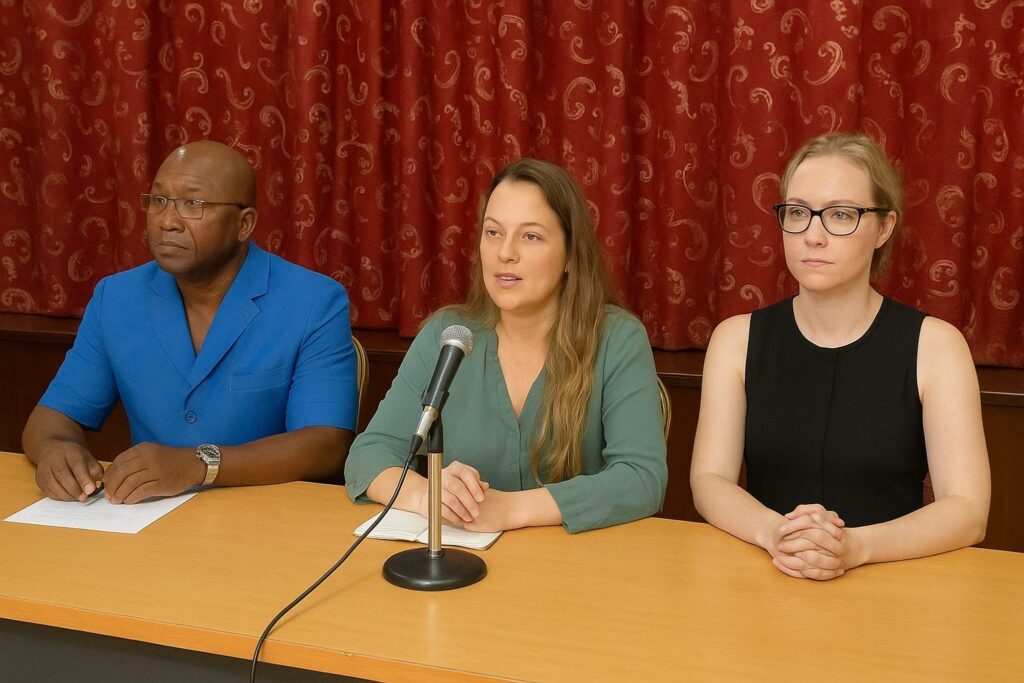Annual strategy session sets the tone
The soft late-September light filtering into the library of Brazzaville’s Russian House did little to temper the seriousness of purpose that animated the educators assembled there on 25 September. Convened by Director Maria Fakhrutdinova, principals, academic deans and teachers of Russian reviewed the previous school year and defined the objectives that will guide instruction in 2025-2026. The gathering has become a fixture of the capital’s educational calendar, but this edition carried a particular weight, linking the customary evaluation exercise to fresh resources promised by Moscow. “Each year we meet before classes resume in order to set clear targets and measure the ground covered,” Fakhrutdinova reminded her guests, framing the meeting as both an audit and a forward-looking laboratory.
Native-speaker teachers provide a decisive boost
A novelty that generated palpable enthusiasm was the arrival—after a lengthy hiatus—of qualified teachers dispatched from Russia for a full academic cycle. Their mandate is twofold: reinforce classroom practice and coach local colleagues. “They have come to upgrade the skills of their peers and breathe new life into the language,” the Russian House director explained. In a system where most instructors are Congolese graduates of Russian universities, the presence of native speakers is expected to sharpen pronunciation, diversify pedagogical tools and showcase contemporary cultural references, thereby making the curriculum resonate more vividly with students.
Scholarships anchor a robust incentive structure
The strategic appeal of Russian transcends the classroom. Fakhrutdinova was keen to remind her audience that the Federation awards some 250 scholarships each year to Congolese baccalaureate holders, a pipeline that opens the doors of Russian universities across disciplines. Participation in international contests further sweetens the prospect for ambitious teenagers weighing their post-secondary options. “It is now that you must choose your future,” she exhorted, underscoring that Russian has become an international working language in sectors ranging from engineering to cultural diplomacy. By casting mastery of Russian as a pragmatic investment in employability, the director positioned the language not as an exotic elective but as a passport to graduate training and professional mobility.
Operational bottlenecks temper the momentum
The exchanges nonetheless laid bare structural bottlenecks. Certain public schools, among them Thomas-Sankara High School, still lack a dedicated Russian teacher. Bilingual textbooks remain scarce, and school libraries are struggling to keep pace with demand for up-to-date reference material. Roger Kandza, an administrator at the Russian House, detailed stop-gap measures already in motion: oral-presentation workshops, slam sessions and theatre initiatives designed to bring language learning to life. “We do not yet have enough staff to visit every lycée within a single year, but that is the goal,” he conceded. Importantly, Kandza clarified that scholarship eligibility extends to the nation’s top graduates regardless of their stream or whether they studied Russian in a literary track, a clarification that partly alleviates concerns about unequal access.
Pedagogical dividends already visible
Testimony from the field gave substance to the optimism. Ferty Mbemba, academic dean at Emery-Patrice-Lumumba High School, reported a clean sweep of success among candidates who sat for the 2024-2025 baccalaureate with Russian as a subject. “The first advantage is the relative ease with which our learners take to the language,” he observed, noting that animated teaching methods and close institutional support had translated into tangible academic gains. Mbemba’s praise for the Russian House—”highly visible and supportive of both pupils and staff”—suggested that targeted interventions, even if unevenly distributed, are already bearing fruit.
A pragmatic choice for a diversified future
The picture that emerges is one of measured progress. Russian language studies are carving out a stable niche in Congo-Brazzaville’s secondary system, propelled by scholarships, native-speaker input and extracurricular creativity, yet still constrained by staffing gaps and material shortages. The authorities at the Russian House have articulated a roadmap that seeks to consolidate gains rather than chase dramatic expansion, a stance that dovetails with the country’s broader policy of diversified international partnerships. For Congolese students navigating an increasingly multipolar world, the decision to add Russian to their linguistic arsenal appears less a speculative gamble than a carefully calibrated step toward global relevance.

